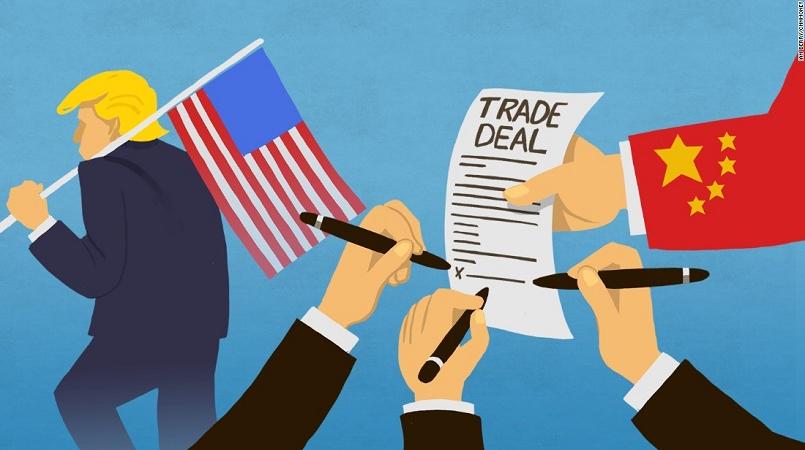"Seeing possibilities in potatoes" is the upbeat slogan of Lamb Weston Potato Products, Inc., an American exporter.
“在土豆中看見無限可能”,這是美國出口商藍威斯頓薯業公司的一條樂觀的標語。
But new trade deals mean that its foreign competitors have fewer obstacles blocking their view.
但新的貿易協定意味著遮擋其外國競爭對手視線的障礙越來越少了。
One is the Comprehensive and Progressive Agreement for Trans-Pacific Partnership (CPTPP), which came into effect on December 30th.
其中一份是于12月30日生效的全面與進步跨太平洋伙伴關系協定(CPTPP)。
Negotiated as the TPP between 12 countries and agreed between 11, after President Donald Trump pulled America out,
TPP由12個國家協商而成,唐納德·特朗普總統讓美國推出TPP后,11國達成CPTPP協議,
the deal will phase out tariffs on frozen potato chips and mashed potato, benefiting Lamb Weston's Canadian rivals.
該協議將逐步取消針對速凍馬鈴薯條以及土豆泥的關稅,藍威斯頓的競爭對手因而受益。
And another trade deal, between the European Union and Japan, to be implemented on February 1st, will do the same for its European ones.
另一項歐盟和日本之間的協議將于2月1日實施,其內容和歐洲協議一致。

The coming year is shaping up to be one of preferential trade deals, where two or a group of countries agree on their own trading rules.
明年將成為特惠貿易協議的一年,兩國或多國將對本國交易規則達成協議。
As well as CPTPP and the EU-Japan deal, America is aiming to strike several: with Japan, the EU and China.
和CPTPP以及歐日協議一樣,美國計劃和日本、歐盟以及中國達成幾項協議。
Will they act as stepping stones towards broad trade liberalisation—or, on the contrary, distort trade and divide the world into competing trade regions?
這些協議會成為廣泛貿易自由化的墊腳石么—還是,正好相反,破壞貿易并將世界分割為相互抵觸的貿易區域?
And what will be the impact on the multilateral system overseen by the World Trade Organisation (WTO)?
并且這將對受國際貿易組織(WTO)監管的多邊貿易體制造成怎樣的影響呢?
Economists have long argued about the impact of preferential trade deals.
經濟學家一直以來都對特惠貿易協議的影響爭論不休。
For purists, it would be best if all trade took place under the WTO's "most-favoured nation" (MFN) principle,
對純粹主義者而言,如果所有貿易都在WTO的“最惠國”(MFN)原則下進行是最好的,
which means that a tariff cut offered to one member must be offered to all, thus putting all exporters on an equal footing.
這意味著提供給一位成員國的關稅削減將必須提供給所有成員國,因此,所有出口方都是平等的。
Others—self-described pragmatists—fear that reliance on the MFN principle would cause gridlock.
其他人—自稱為實用主義者—擔心對MFN原則的依賴會導致僵局。
If some countries are happy with the status quo, others might be reluctant to cut tariffs for fear of granting rivals a free ride.
如果一些國家對現狀滿意,其他國家可能會因為擔心競爭對手會坐享其成而不愿降低關稅。
China, for example, could refuse to reform while benefiting from lower American and European duties.
例如,中國享受著美國和歐洲的更低關稅卻拒絕改革。
Better, the pragmatists think, to strike smaller deals between like-minded members. That could spur laggards onwards:
實用主義者認為,最好是在那些志同道合的成員國中達成小范圍的協議。這樣會刺激落后者前進:
Brent Baglien, Lamb Weston's vice-president of government affairs, urged the United States Trade Representative (USTR),
藍威斯頓政務副總裁布倫特·巴格林敦促美國最高貿易辦公室美國貿易代表署(USTR)
America's top trade official, to seek a deal with Japan that would eliminate its 8.5% tariff on American imported potatoes.
和日本達成協議,對美國進口的土豆減稅8.5%。
"Once the US loses an export customer, it is extremely hard, if not impossible, to get it back," he warned.
“美國一旦失去一位出口客戶,就難以(如果有可能的話)再挽回他,”他警告稱。
譯文由可可原創,僅供學習交流使用,未經許可請勿轉載。












